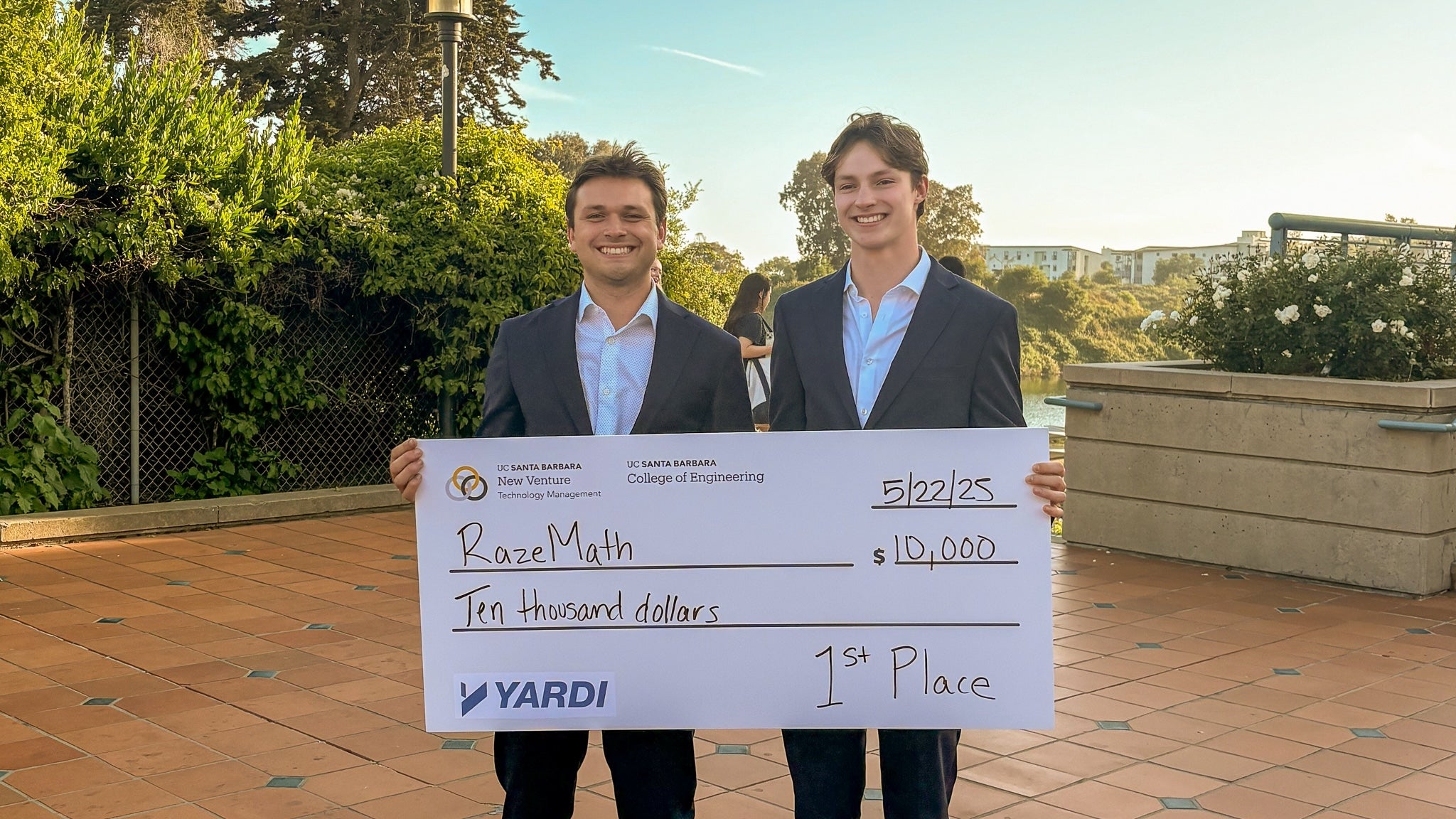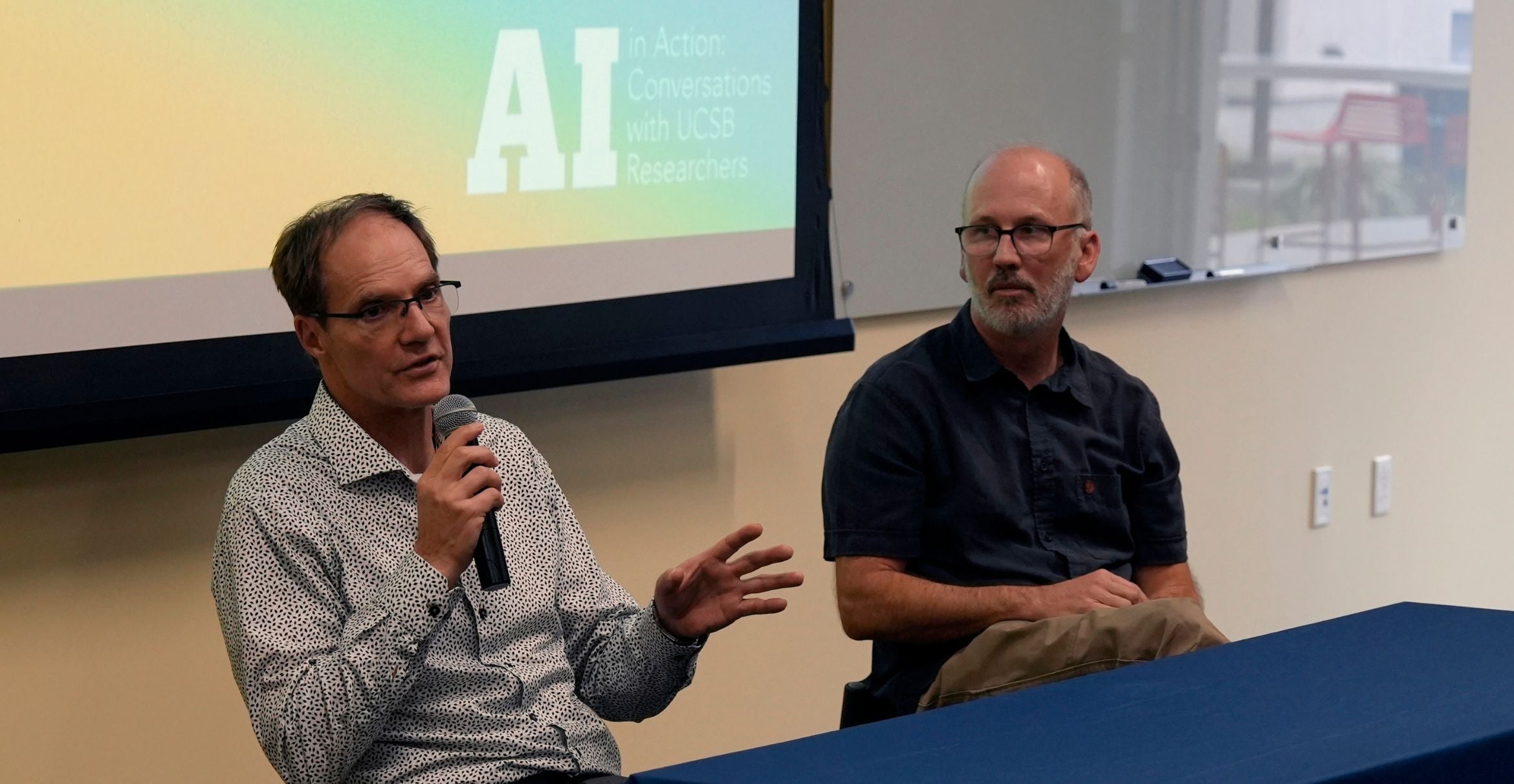
Pitching a business that uses artificial intelligence to provide individually tailored math tutoring for college students struggling with advanced coursework, the student creators of RazeMath won first place during UC Santa Barbara’s 26th Annual New Venture Competition (NVC) Finals, earning $10,000 in cash and prizes. The RazeMath team is led by Nico Lehner, an economics major, and Evan McCall, a mathematics major, both part of the Class of 2026.
“Winning the New Venture Finals feels like the culmination of a lot of hard work, a lot of early mornings, and a lot of late nights. Everyone on the team has been so on-board mastering this market and figuring out the insights we needed to bring RazeMath further,” said McCall, who works as an AI prompt engineer with an emphasis on enhancing the mathematical capabilities of AI models. “We’re so happy that it turned out this way because we really believe in the impact of RazeMath. We want students from all backgrounds to succeed and we’re happy that this brings us in that direction.”
The event marked the culmination of the Technology Management (TM) Department’s rigorous eight-month program in which undergraduate and graduate students across all disciplines work in teams to address a business problem or opportunity and take their business ideas from conception to reality. This year’s roster consisted of over 350 students who were advised by over fifty mentors, all of whom have lived and thrived in the fast-paced world of tech entrepreneurship. Of the 44 teams that started the program in October 2024, 20 were selected to participate in the New Venture Fair this spring; just six of those teams advanced to the finals.
“Our program is built on the backs of our mentors. There’s no way we get forty to fifty teams through this program with the depth of work and the quality that we see without their contribution and input,” said Dave Adornetto, TM’s entrepreneurship director. “This is possibly the best prepared group of students we’ve had in my eleven years with the program.”
During the NVC finals, each team pitched its products and business plan and answered questions from the audience. A panel of four judges with entrepreneurial experience met with and evaluated the teams prior to the finals. Judges awarded first place and $10,000 to RazeMath, second place and $7,500 to JAFFX, and third place and $5,000 to MasterMinding. JAFFX pitched an open-source guitar pedal that promotes community-driven development and sharing of digital audio effects. MasterMinding developed a teacher AI agent for high schools that streamlines lesson planning by transforming hours of work into a rapid, intuitive process.
“It’s really hard for our judges to pick a single winner in a field like this,” said Adornetto. “What set RazeMath apart was the depth of customer discovery work they completed over the course of the program, and their ability to respond to tough questions from the judges about their business model.”
As recent California legislation, bills AB 705 and AB 1705, pushed some community colleges to expedite their degree completion process and cut funding for preparatory math classes, McCall said, students get launched into college level courses underprepared — and unable to keep up. To solve this problem, McCall and Lehner created RazeMath, an AI-powered platform that breaks down complex math problems into individualized explanations based on each student’s learning history and encourages comprehension with step-by-step solutions.
“We are able to democratize education by making high-quality, personalized math tutoring available to students from all backgrounds,” said McCall. “Empowering students from everywhere to succeed equally.”
The creation of this platform started by assessing the needs and problems facing college math departments to best understand how RazeMath could fill in the gaps. The team traveled the coast of California, literally knocking on the doors of math departments, and gathered over 300 in-person interviews with professors, department heads and faculty. They created relationships with nearly 20 California colleges and universities, and they launched three pilot programs.
“Interviewing door-to-door was both fun and challenging,” explained McCall. “Often, professors would be busy and reluctant to have a conversation, but the ones who were intrigued ended up giving us valuable feedback to bring our product further along.”
After winning the NVC Finals, the team’s first course of action will be to secure additional funding. From there they plan to move into other subjects, like computer science and statistics, in late 2026. They also hope to integrate an instructor insight dashboard and connect with schools’ existing systems, like Canvas, to automate grading and assignments. Finally, in 2027, they hope to expand into K-12 education and open a direct-to-consumer channel to sell individual licenses to both students and parents.
“This is just the beginning for RazeMath,” said Lehner. “We’re going to expand as quickly as we can and help as many people as we can to break down educational barriers.”
Honorable mentions and $2,500 apiece were awarded to: NetSplit, which pitched a software solution that manages and monitors internet performance for shared facilities; Copona, which created an augmented reality retail solution that enhances in-store shopping using smart glasses; and Assistive Tech, which offers a non-invasive biomarker test, through the use of VR headsets, that detects Alzheimer’s risk up to 15 years before symptoms appear. Assistive Tech also won people’s choice award and $5,000.
Three other awards were given to teams who showed promise but did not make it to the finals: Spotlight NIL was named the NV Fair runner-up, Resa was named most improved, and the impact award went to Resilireef.
This year’s NVC judges included UCSB alumnus Peter Buckland, partner, managing director and COO at Khosla Ventures; Phil Carpenter, founder and principal of Ronin, executive chair of Ventech Technology Forum and lecturer in marketing at UCSB; Siouxsie Jennet, founder and CEO of Mambo Media, who also launched the first web presences for companies including McDonald’s, Visa and Nokia; and Max Menke, a venture investor and co-founder of GrowthX, an early-stage VC firm where he builds and runs The Revenue Accelerator.



